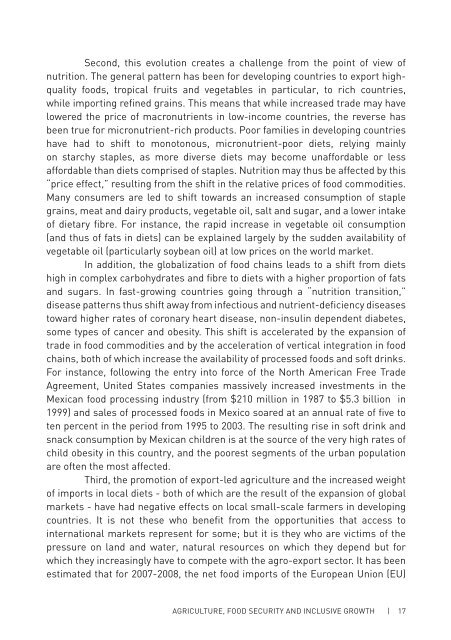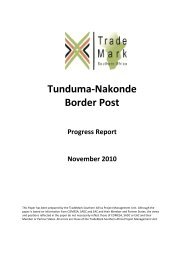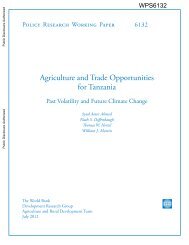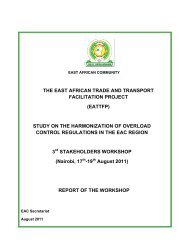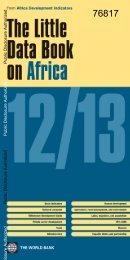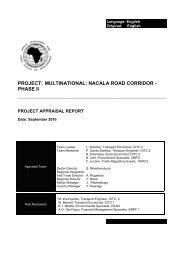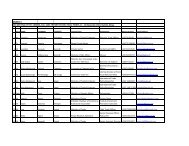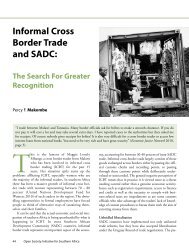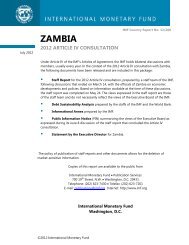Agriculture, Food Security and Inclusive Growth - SID Netherlands ...
Agriculture, Food Security and Inclusive Growth - SID Netherlands ...
Agriculture, Food Security and Inclusive Growth - SID Netherlands ...
You also want an ePaper? Increase the reach of your titles
YUMPU automatically turns print PDFs into web optimized ePapers that Google loves.
Second, this evolution creates a challenge from the point of view of<br />
nutrition. The general pattern has been for developing countries to export highquality<br />
foods, tropical fruits <strong>and</strong> vegetables in particular, to rich countries,<br />
while importing refined grains. This means that while increased trade may have<br />
lowered the price of macronutrients in low-income countries, the reverse has<br />
been true for micronutrient-rich products. Poor families in developing countries<br />
have had to shift to monotonous, micronutrient-poor diets, relying mainly<br />
on starchy staples, as more diverse diets may become unaffordable or less<br />
affordable than diets comprised of staples. Nutrition may thus be affected by this<br />
“price effect,” resulting from the shift in the relative prices of food commodities.<br />
Many consumers are led to shift towards an increased consumption of staple<br />
grains, meat <strong>and</strong> dairy products, vegetable oil, salt <strong>and</strong> sugar, <strong>and</strong> a lower intake<br />
of dietary fibre. For instance, the rapid increase in vegetable oil consumption<br />
(<strong>and</strong> thus of fats in diets) can be explained largely by the sudden availability of<br />
vegetable oil (particularly soybean oil) at low prices on the world market.<br />
In addition, the globalization of food chains leads to a shift from diets<br />
high in complex carbohydrates <strong>and</strong> fibre to diets with a higher proportion of fats<br />
<strong>and</strong> sugars. In fast-growing countries going through a “nutrition transition,”<br />
disease patterns thus shift away from infectious <strong>and</strong> nutrient-deficiency diseases<br />
toward higher rates of coronary heart disease, non-insulin dependent diabetes,<br />
some types of cancer <strong>and</strong> obesity. This shift is accelerated by the expansion of<br />
trade in food commodities <strong>and</strong> by the acceleration of vertical integration in food<br />
chains, both of which increase the availability of processed foods <strong>and</strong> soft drinks.<br />
For instance, following the entry into force of the North American Free Trade<br />
Agreement, United States companies massively increased investments in the<br />
Mexican food processing industry (from $210 million in 1987 to $5.3 billion in<br />
1999) <strong>and</strong> sales of processed foods in Mexico soared at an annual rate of five to<br />
ten percent in the period from 1995 to 2003. The resulting rise in soft drink <strong>and</strong><br />
snack consumption by Mexican children is at the source of the very high rates of<br />
child obesity in this country, <strong>and</strong> the poorest segments of the urban population<br />
are often the most affected.<br />
Third, the promotion of export-led agriculture <strong>and</strong> the increased weight<br />
of imports in local diets - both of which are the result of the expansion of global<br />
markets - have had negative effects on local small-scale farmers in developing<br />
countries. It is not these who benefit from the opportunities that access to<br />
international markets represent for some; but it is they who are victims of the<br />
pressure on l<strong>and</strong> <strong>and</strong> water, natural resources on which they depend but for<br />
which they increasingly have to compete with the agro-export sector. It has been<br />
estimated that for 2007-2008, the net food imports of the European Union (EU)<br />
AGRICULTURE, FOOD SECURITY AND INCLUSIVE GROWTH | 17


